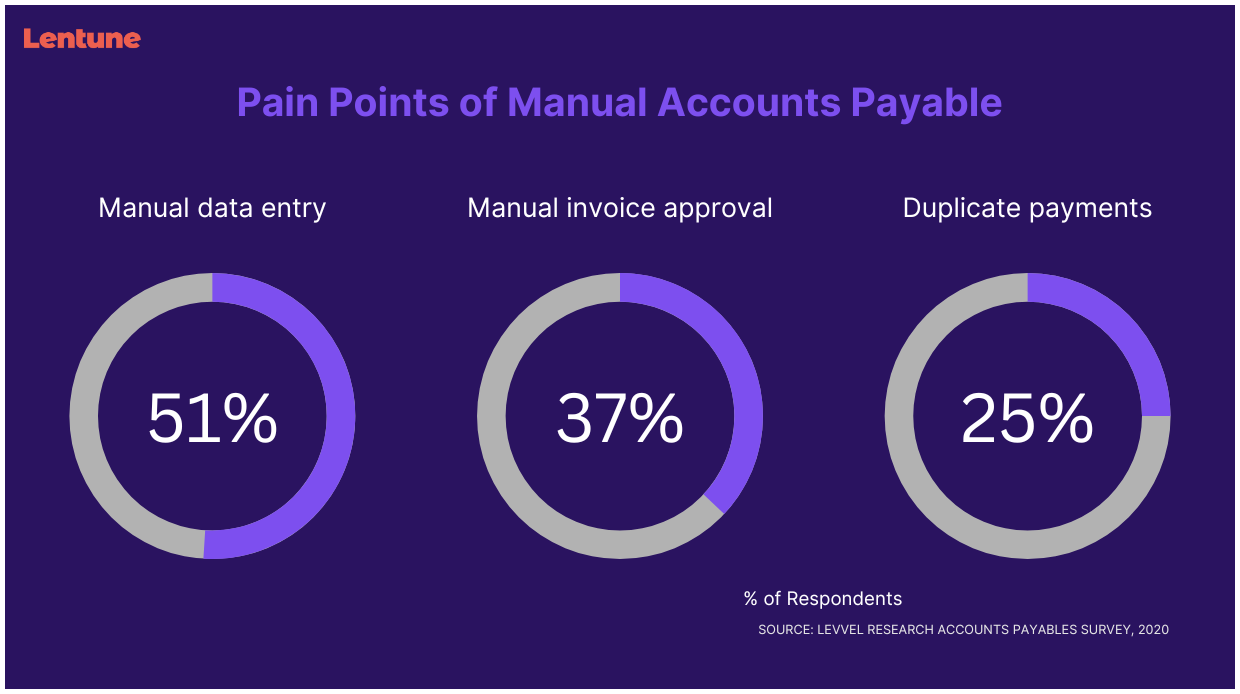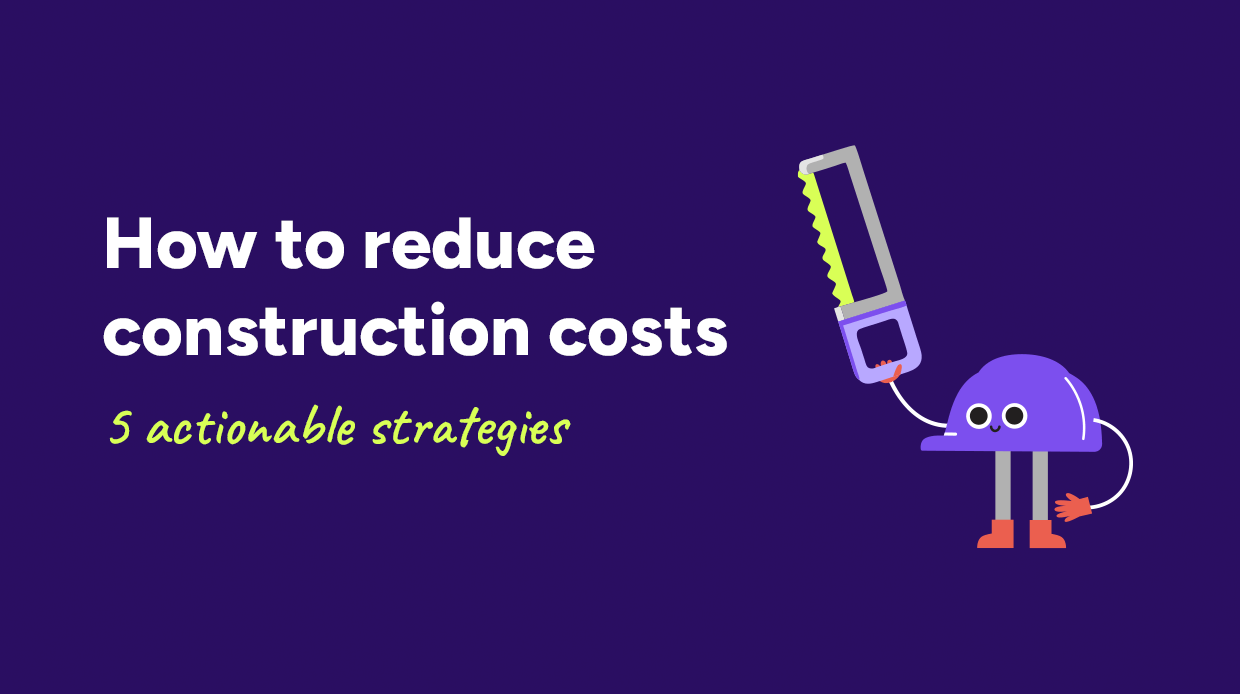The Ultimate Guide to Invoice Automation for Construction
Introduction
As the construction industry continues to grow, businesses are constantly seeking ways to streamline their processes and maximise efficiency.
One area that’s often overlooked, however, is the accounts payable. Manually processing your AP invoices is a simple system, and it works. Until it doesn’t.
Eventually, your business grows to a point where stacks of paper and manual spreadsheets just aren’t productive. Your team are probably starting to resonate with a few of these stats:
- 88% of finance professionals want greater visibility of project spend in real-time.
- 97% of finance teams waste time chasing down invoice details every month.
- Only 8% of finance professionals feel they currently have an adequate level of automation in their role.
So, you eventually hear about this clever technology called Invoice Automation.
But what exactly is invoice automation? How does it work? And how can you find the best automated invoice processing software for your business?
We have got the answers! In this article, we’ll explore all the ins and outs of invoice automation, so you’ll know if it’s the right solution for your business. Let’s get started.
Should I use invoicing software for my construction business?
What is invoice automation?
Invoice automation is a type of software that helps you automate the accounts payable process. By digitising the entire invoicing workflow, it eliminates the need for manual data entry, streamlines invoice approval and offers better visibility into your company's spending.
With invoice automation, your finance team can spend less time chasing down invoice details and more time focusing on strategic tasks, such as financial planning and analysis. In other words, invoice automation helps your team work smarter, not harder.
How does automated invoice processing work?
At Lentune, we say automated invoice processing software works like magic. But what does that really mean?
Essentially, invoice automation software uses a combination of optical character recognition (OCR) and machine learning to extract data from invoices and process them instantly. It works like this:
- Invoice Capture: Invoice automation software captures invoices straight from your inbox and extracts the key data, such as supplier name, invoice number, due date and pricing.
- Price checking: The software will verify the invoice details by matching them to POs and delivery notes, and checking against any agreed pricing, often referred to as 3-way matching.
- Invoice Approval: The software automatically delegates the invoice to the appropriate approver, who can review and approve the invoice in a few clicks.
- Payment Processing: The software automatically generates payment instructions and sends them to your accounting system, such as Xero or MYOB for payment.
With invoice automation, you'll have a completely automated accounts payable workflow, so no more scrambling to process all your invoices at the end of the month!

Let's look at some of the benefits this clever software can bring to your business.
5 signs you need to automate your accounts payable process
Benefits of invoice automation software
The construction industry generates large volumes of invoices, purchase orders, and other documents daily, making it one of the most paper-intensive industries.
This creates a real headache when it comes to matching, storing, and processing all those documents. But invoice automation can provide several benefits to your construction business, including:
1. Faster invoice processing time
One of the most significant benefits of invoice automation is the increased efficiency it provides. By automating manual processes such as data entry, invoice matching, and approval workflows, businesses can save time and reduce errors.
Many of our customers using Lentune Invoice Automation report it has helped them reduce their invoice processing time by up to 70%. This means your finance team can spend less time on administrative tasks and more time on strategic activities that drive growth for your business.
2. Improved visibility and control of costs
With traditional accounts payable methods, it can be difficult to track project spending until after it has occurred. In fact, a recent survey shows this is a problem faced by over 54% of finance teams.

Another study shows 61% of executives are making decisions based on outdated data due to slow manual processing. Invoice automation solves these issues by providing real-time visibility into your financial data.
From an intuitive dashboard, you can easily see which invoices are awaiting approval and which approver they're sitting with. This helps you manage budgets, make informed decisions and complete the month-end close more efficiently.
3. Everyone's in the loop, from anywhere
Accounts payable automation software centralises your records not only in the office, but also on the go. With cloud-based solutions, you can access invoices and approval workflows from anywhere, at any time.
Plus, with mobile app functionality, your accounts payable data is always at your fingertips. So, no more chasing paperwork or wondering who has approved what.
Automated invoice processing keeps everyone in the loop, improving communication and collaboration across your entire team. That’s helpful.
4. Fewer errors and cost savings
Manual accounts payable processes are prone to errors. Invoices can be lost, misplaced, or duplicated, often leading to rework, delays and additional costs.
But invoice automation eliminates these errors by streamlining the invoice approval process. With automated purchase orders and accurate cost coding, you'll always have an up-to-date total of project spend.
Plus, with fewer manual errors and greater efficiency, you can complete projects more quickly and with fewer resources, helping you to boost profit margins.
7 benefits of accounts payable automation software
Manual vs. automated accounts payable processes
Switching from manual to automated invoice processing can seem like a daunting task. Your team may even have objections to invoice automation, but the benefits far outweigh any initial resistance.
Here are the key differences between manual and automated accounts payable:
1. Forget about data entry
Invoice automation helps make your day less mundane and boring. Many construction businesses spend 15–20 hours each week processing supplier invoices, which can lead to employee burnout and increased costs.
But with invoice automation, your staff no longer need to spend time on this humdrum task. Instead, approved invoices are seamlessly synced to your accounting software for payment.
That frees up your team so they can focus on the big stuff! Plus, they'll love the improved efficiency and reduced workload.

2. You can stop chasing approvers
Are you tired of constantly chasing approvers? Do you have stacks of invoices waiting for signatures that never seem to come? You wouldn't be alone.
According to Levvel Research, 37% of businesses identify manually routing invoices for approval as their top accounts payable challenge. But there's a better way.
With invoice automation, you can finally put an end to your constant pursuit of approvers. Instead, welcome a streamlined and efficient workflow.
Your invoices are now automatically delegated to the correct approvers. They'll receive a notification and can complete their approval online with one click - talk about convenient!
3. No more lost invoices
Forget about cluttered inboxes and overflowing filing cabinets. Invoice automation streamlines your accounts payable and ensures you never miss an invoice again.
With accounts payable automation, every invoice is now digitally tracked and stored, making it easy to locate and process payments on time, every time.
So, no more missed payments, late fees or frustrated suppliers. How good would that be?
4. Accurately assign cost codes
In the construction industry, accurate cost coding is essential for maintaining profitability and managing budgets. But manually assigning cost codes can be time-consuming and prone to errors.
Invoice automation software will help by automatically assigning cost codes to invoices based on pre-set rules. This not only saves time but also ensures greater accuracy in cost allocation.
With automated cost coding, you'll have a clear understanding of project costs, making it easier to manage budgets and allocate resources. Plus, with greater visibility into your financial data, you can make informed decisions that drive growth for your business!
Why the manual invoice processing model is broken
Make the most of invoice processing systems
Choosing the best invoice automation software
So, you're ready to embrace the magic of invoice automation but feeling overwhelmed by all the options? Don't worry, we've got you covered!
When evaluating different solutions, consider these key questions:
- Is the software industry-specific? Make sure the software is designed for the construction industry, so it includes all the features and functionalities you need for your business.
- Does it integrate with the products you already use? You shouldn't have to disrupt your entire workflow. Look for a solution that can easily integrate with your existing accounting and project management software, such as Procore and Xero.
- Does the software include reporting capabilities? It's essential to have access to real-time data to make informed business decisions. Make sure the software includes detailed reporting features.
- Will it allow you to scale? As your business grows, you need an invoice automation software that can keep up. Look for a system that can easily process more invoices as your business expands.
- Does the system remove manual work? The whole point of automating your accounts payable is to eliminate manual tasks. Make sure the software you choose streamlines the entire process, from invoice receipt to payment.
- Will it enable remote work? It's important to choose a cloud-based solution that allows you to access your financial data from anywhere and from any device.
- Does the product offer onboarding and customer support? Even the best software isn't helpful if you don't know how to use it or run into an issue. Choose a product that provides onboarding and training, as well as ongoing customer support.
The best way to answer all these questions is to browse the provider's website and book a demo. This will allow you to see the product in action and ask questions to ensure it meets your business's needs.
4 must-have features of accounts payable software for automation
Wrapping it up
For an industry that has for so long relied on manual workflows, invoice automation is proving to be a real game-changer.
From faster invoice processing time to eliminating the hassle of chasing approvers, this technology completely streamlines the way construction businesses handle their accounts payable.
It's not just the way of the future; it's already here! Many construction businesses are already using invoice automation to save 70% of their admin time. Will your business be next?
How we can help
At Lentune, we help construction companies streamline the way they handle project finances. Our project cost management and automation tools help you to save money, improve cash flow and increase productivity. We'd love to show you how it works!
In our 10-minute recorded demo, we'll show you how our invoice automation module streamlines your workflow and gives you more time for the things that matter.
Discover more from the blog

How Does AP Automation Work? Understanding the Benefits and Process

How to Reduce Construction Costs: 5 Actionable Strategies


.jpg?width=2583&height=1250&name=Png%20link%20for%20Ebook%201240x600%20(1).jpg)